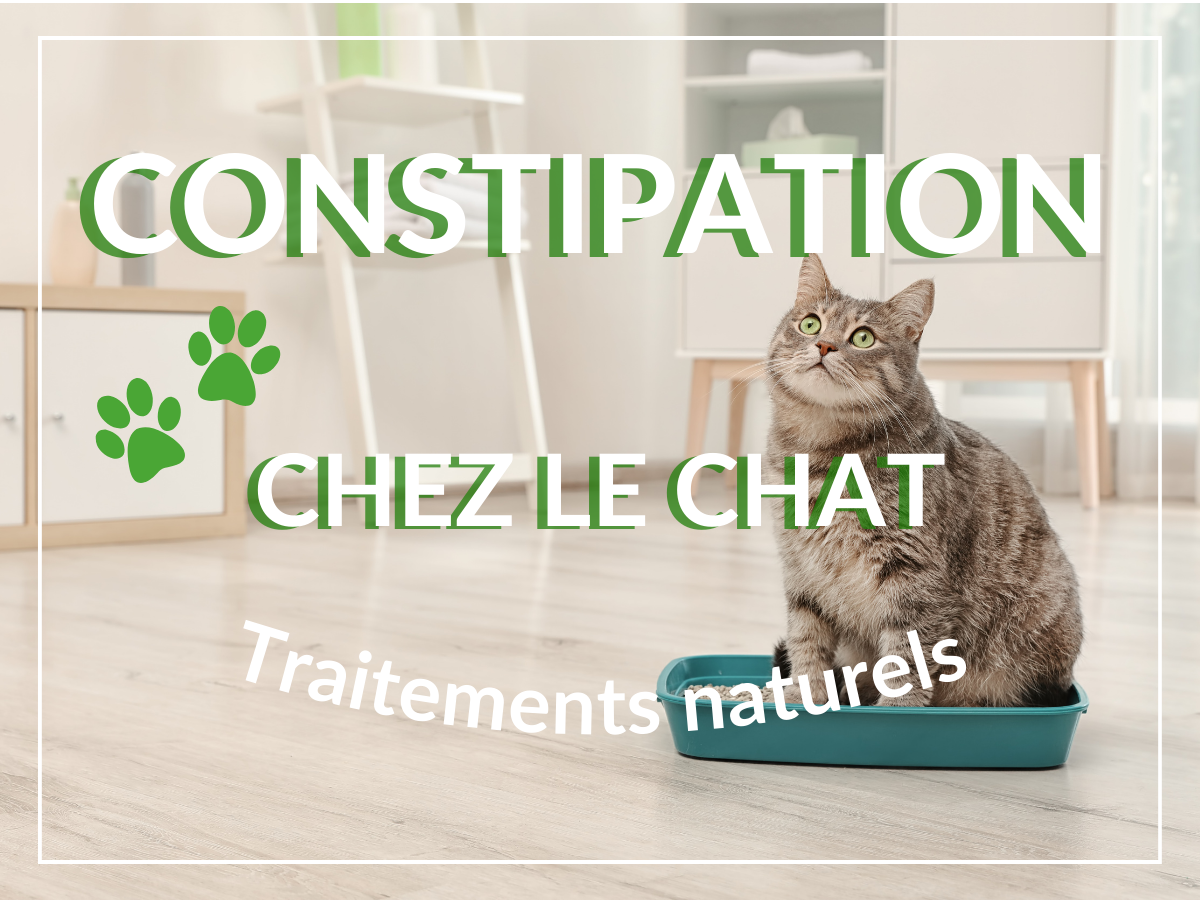
How to Help Your Constipated Cat? 5 Natural Laxatives! 2025
If you've ever noticed your cat struggling to use the litter box or showing signs of discomfort during defecation, it's possible they are suffering from constipation, a common yet uncomfortable condition that can seriously affect their quality of life.
Understanding what contributes to this problem, recognizing the symptoms, and knowing the available treatment options are essential for helping your four-legged friend.
In this article, we offer a complete guide on feline constipation, exploring underlying causes, signs to watch for, as well as conventional treatments and natural remedies. We particularly focus on gentle and effective solutions that can act as natural laxatives, helping you manage this common condition and improve your feline friend's well-being.
What is constipation in cats?

Constipation is characterized by a cat's inability to defecate regularly, with stools becoming dry, hard, and difficult to pass. If your cat has not had a bowel movement for three to five days, it is likely constipated, which requires intervention.
What are the causes of constipation in cats?

Constipation in cats can be caused by a variety of factors, each affecting the animal's digestive system in different ways.
One of the most common factors is a poor fiber diet. Fiber plays a crucial role in managing digestive health by facilitating the regular passage of stools. Without enough fiber, stools can become hard and difficult to pass.
Dehydration is another frequent culprit. Cats often do not naturally consume enough water, and low water intake can quickly lead to dry and compact stools. Cats fed primarily dry food are especially at risk, as they do not get the additional moisture found in canned foods.
Lack of exercise can also contribute to constipation. Physical activity helps stimulate intestinal transit and maintain regular bowel movements. Indoor cats, particularly those that are less active or older, may be more likely to develop constipation due to their sedentary lifestyle.
Finally, underlying health issues such as metabolic disorders, kidney diseases, or intestinal obstructions due to foreign bodies, tumors, or inflammatory bowel diseases, can all lead to constipation. These conditions can affect a cat's normal defecation ability by causing pain or reduced intestinal motility.
How can you tell if your cat is constipated and when to worry?

Identifying constipation in a cat involves monitoring certain key symptoms. The most obvious symptom is excessive straining during defecation, often without success, which can be observed in the litter box.
A constipated cat may also show signs of discomfort or pain around its abdomen, frequently lick its rear end, or adopt a tense and hunched posture.
A bloated and hard belly to the touch is another indicator that the cat's digestive system may be distressed.
Lack of appetite may also occur, as constipation can make the cat uncomfortable or painful.
It is crucial to worry and consult a veterinarian if symptoms persist for more than 48 hours or if the cat shows signs of significant distress, such as pain meows or lethargy.
Additionally, if you observe blood traces in the cat's stool or if it stops eating completely, immediate veterinary intervention is necessary. These symptoms may indicate a more serious condition requiring urgent treatment.
What are the conventional treatments for constipation in cats?

Conventional treatment options include laxatives prescribed by veterinarians, enemas, and sometimes even surgery in cases of severe obstruction.
It is critical to never administer human laxatives sold in pharmacies to a cat without the supervision of a veterinarian, as this could worsen the situation.
Are there natural remedies to relieve a constipated cat?

Various natural solutions can act as natural laxatives and offer gentle yet effective relief to a constipated cat. Here's a detailed exploration of each remedy:
1) Zucchini
Zucchini, being rich in water and fiber, can play a crucial role in preventing and treating constipation in cats. This vegetable not only helps hydrate the intestine but also promotes better stool consistency by increasing their water content, which eases their passage through the digestive system.
To incorporate zucchini into your cat's diet, start by giving small portions of cooked zucchini without seasoning. Ensure it is cut into small pieces or grated to ease ingestion and digestion.
Gradually increase the amount based on your cat's reaction, without exceeding a tablespoon per day to avoid any indigestion or counter effects.
2) Salmon Oil
Salmon oil is rich in omega-3 fatty acids, which are known for their anti-inflammatory properties and promoting overall skin and coat health in cats. In terms of constipation, omega-3s act by lubricating the intestinal walls, which can help soften stools and promote more regular intestinal transit.
To administer salmon oil, it is recommended to add a small amount, about a half-teaspoon, to your cat's wet food every day. It is important to choose high-quality salmon oil specifically designed for pets, as it is purified and free from harmful contaminants that might be present in oils intended for human consumption.
As with any addition to your cat's diet, introduce salmon oil gradually and monitor your pet's reaction to ensure they tolerate it well.
3) Olive Oil
Olive oil is a natural remedy often recommended to help relieve constipation in cats due to its lubricating properties. By lubricating the intestines, olive oil can ease the passage of hard and dry stools, making defecation less painful for the animal.
To use it safely, add a small amount of olive oil—about a quarter teaspoon—to your cat's wet food once or twice a week. It is important not to overuse it to avoid diarrhea or other digestive issues and always consult your veterinarian before introducing it into your cat's diet, especially if your cat has specific medical conditions.
4) Psyllium
Psyllium, a soluble fiber, is derived from the seeds of a plant called Plantago ovata. When ingested, psyllium absorbs water and forms a gel that can help soften stools and promote regular intestinal transit.
In cats, this fiber also helps to create bulk in the intestines, thereby stimulating the natural contractions of the colon to aid elimination.
Introduce psyllium into your cat's diet by sprinkling a small amount of the powder (start with an eighth of a teaspoon) on their wet food once a day. Ensure your cat has access to plenty of water, as psyllium can become constrictive if not accompanied by adequate hydration.
5) Hydration
Speaking of hydration, it is crucial to note that water plays an essential role in both the prevention and treatment of constipation in cats. Proper hydration facilitates the general passage of stools by keeping the intestines sufficiently lubricated.
Cats naturally have a low tendency to drink water, which makes them more prone to dehydration and thus constipation.
To encourage your cat to drink more, consider using cat water fountains, which stimulate their interest with flowing water. Additionally, incorporating more wet food into their diet can also increase their water intake.
What is megacolon in cats?

The megacolon in cats is a severe and potentially debilitating condition where the colon abnormally enlarges and loses its ability to function properly. This typically results from chronic constipation which, if left untreated, can lead to excessive stretching of the colon.
Over time, the colon becomes so distended that it can no longer push the stools towards the exit, causing further accumulation and exacerbation of constipation.
How to improve the comfort of a constipated cat?

Improving the comfort of a constipated cat goes beyond medical or natural treatment. Abdominal massages can play a crucial role in gently stimulating the animal's intestines, which can help trigger the movement of stools.
To perform an abdominal massage, gently place your hands on your cat's belly and perform slow, gentle circular movements. Be very gentle to avoid causing discomfort or pain to your animal.
How long can a kitten go without defecating?

For kittens, constipation requires special attention. A kitten should not normally go more than 24 hours without defecating.
If you notice that a kitten has not defecated within this timeframe, it is important to consult a veterinarian as soon as possible.
Kittens are particularly vulnerable to the effects of constipation because their digestive system is still developing, and prompt intervention can prevent serious complications such as fecal impaction or other gastrointestinal problems.
To help prevent constipation in kittens, ensure they have a diet appropriate for their age, rich in fiber, and that they drink enough water.
Conclusion
Cat constipation can range from mild to severe, but with the right interventions, including natural remedies and homeopathic treatments, you can help alleviate your cat's symptoms and improve their quality of life.
If you are concerned that your pet is suffering from a health issue, our Free Animal Health Recommendation can assist. In addition to obtaining advice and recommendations from our Natural Health Advisors, they will also guide you through the products and treatment options best suited to your animal's health needs.

























Leave a comment
This site is protected by hCaptcha and the hCaptcha Privacy Policy and Terms of Service apply.